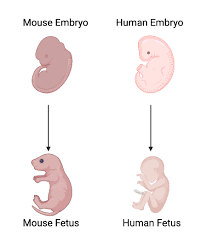What are fossils?
Fossils are the traces or remains of a dead organism.
What is a homologus structure?
Features in some organisms that have a similar function.
What do you study in the study of embroylogy?
Embryos.
What is Molecular biology?
A sequence of amino acids from different organisms.
What is biogeography?
The study of the distribution of earth’s organisms.
Why are fossils important?
Fossils show that life on earth had changed and shows eveloution.
What is an Analogous structures?
Structures in some organisms that have closely related functions but don’t share a common ancestor.
The closer the species are the more they...
Look similar in their embryo.
Organisms that have more genes and amino acids in common are what?
More related.
How does biogeography support the theory of evolution.
Supports the theory of evolution by multiple organisms that have similar traits being found all around the world.
What law indicates that the older layers of rock lay on the bottom while the younger layers are on top?
Law of superstition
What is an example of Analogous structures?
The wings of an insect and a bird allow them to fly but they all evolved to fly at different times
The similarities found in the embryos of species that grow up to be different indicate what?
Common ancestory.
What is a cladogram
A diagram used to show how closely related organisms are.
Fossils of Lystrosaurus were found in Africa, Asia, and Antartica. How does this support biogeography?
Multiple organisms that have similar traits are found all around the world.
What are fossils usaually found in?
Sedimentary rocks
What is a Vestigial structure?
Structures that serve no purpose in specific organisms.
What is the earliest stage of development called?
Embryo.
Tracking mutations in sequences of DNA can..
Trace evolutionary history.
What does biogeography tell us?
This tells us that the world has changed significantly, and how species adapt to their environment.
How do you know if the fossils are newer or older?
The newer fossils are on top and older fossils are farther down.
What do Homologous structures indicate?
Common ancestor.


By looking at the embryos what could u indicate?
They share a common ancestor.
Draw an example of a cladogram (double points)
Look on board
What are ways biogeography show evolution?
By showing that species in different areas evolve to adapt to their environments.